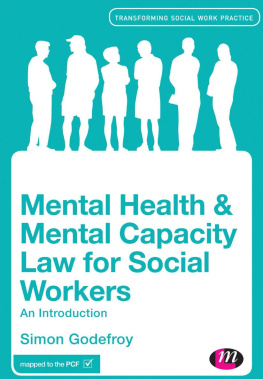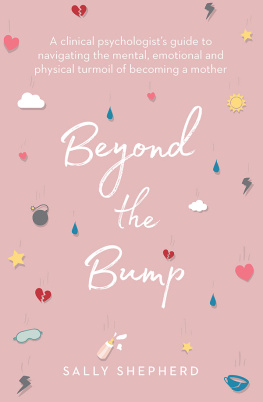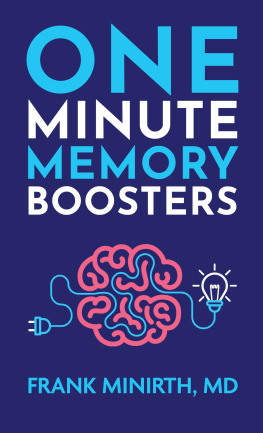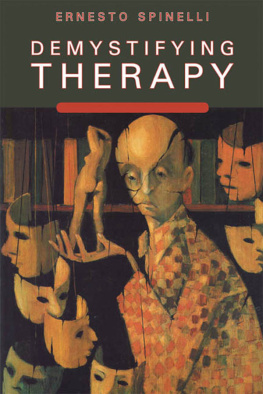Demystifying Mental Capacity
Demystifying Mental Capacity
A guide for health and social care professionals
- Sally Lee
- Lee-Ann Fenge
- Keith Brown
- Michael Lyne
Learning Matters
A SAGE Publishing Company
1 Olivers Yard
55 City Road
London EC1Y 1SP
SAGE Publications Inc.
2455 Teller Road
Thousand Oaks, California 91320
SAGE Publications India Pvt Ltd
B 1/I 1 Mohan Cooperative Industrial Area
Mathura Road
New Delhi 110 044
SAGE Publications Asia-Pacific Pte Ltd
3 Church Street
#10-04 Samsung Hub
Singapore 049483
Editorial Arrangement, and Appendix 1 Sally Lee, Lee-Ann Fenge, Keith Brown and Michael Lyne, 2020. Chapter 1 Lee-Ann Fenge & Sally Lee, 2020. Chapter 2 Michael Lyne & Sally Lee, 2020. Chapters 3 & 4 Alex Ruck Keene, 2020. Chapter 5 Anna Volkmer & Tim Farmer, 2020. Chapter 6 Sally Lee & Michael Lyne, 2020. Chapter 7 Karen Grimshaw, 2020. Chapter 8 Office of the Public Guardian, 2020. Chapter 9 Keith Brown, Lee-Ann Fenge, Sally Lee and Karen Grimshaw, 2020. Appendix 4 Michael Lyne, 2020.
First published 2020
Apart from any fair dealing for the purposes of research or private study, or criticism or review, as permitted under the Copyright, Designs and Patents Act, 1988, this publication may be reproduced, stored or transmitted in any form, or by any means, only with the prior permission in writing of the publishers, or in the case of reprographic reproduction, in accordance with the terms of licences issued by the Copyright Licensing Agency. Enquiries concerning reproduction outside those terms should be sent to the publishers.
Crown Copyright material is published with the permission of the controller of HMSO.
Library of Congress Control Number: 2020933773
British Library Cataloguing in Publication Data
A catalogue record for this book is available from the British Library
ISBN 978-1-5297-1224-7
ISBN 978-1-5297-1225-4 (pbk)
Editor: Kate Keers/Catriona McMullen
Development editor: Sarah Turpie
Senior project editor: Chris Marke
Project management: Deer Park Productions
Marketing manager: Camille Richmond
Cover design: Wendy Scott
Typeset by: C&M Digitals (P) Ltd, Chennai, India
Printed in the UK
At SAGE we take sustainability seriously. Most of our products are printed in the UK using responsibly sourced papers and boards. When we print overseas we ensure sustainable papers are used as measured by the PREPS grading system. We undertake an annual audit to monitor our sustainability.
Acknowledgements
We are grateful to the Burdett Trust for Nursing who have funded a wider research project looking at nurses and health care professionals understanding and use of the Mental Capacity Act (2005) and in particular the issue of seeking and gaining consent when a persons capacity to consent is lacking, limited or fluctuating.
This funding has helped develop our thinking and helped to inspire the creation of this text. It is our sincere hope and desire that it will lead to improved practice in this area.
We would also like to acknowledge the editors of the 39 Essex Chambers Mental Capacity report; Alex Ruck Keenes chapters were drawn from the guides that he led on and they contributed to.
We also want to acknowledge the brief short life of baby Cariad. Although she was only with us for a very short time, her life has had an impact on us as an editorial team. She reminds us all of the importance of focusing on things that really matter, our relationships, our ability to make a difference and ultimately the fragility of life.
Foreword from the Series Editor
An understanding of the Mental Capacity Act (MCA) (2005) and its role and use in professional practice have been complex issues since its inception. The whole basis of the MCA is to ensure that the rights and choices of individuals are heard, listened too and acted upon. Yet there are still far too many anecdotal stories where professionals believe that their professional judgement is the most important aspect in determining how a person is cared for or professionals feel under such a work load pressure that they fail to see or hear the individuals voice/choice.
This new text provides clear guidance on the use and value of the MCA and in particular how to hear from the individual, or the systems and processes that must and should be undertaken to ensure that an individuals wishes are taken into account and that a clear best interests decision is made following the guiding principles of the MCA.
On behalf of the editorial team I would like to thank all the contributors for their input and hard work in supplying this text. They provide a valuable insight and wisdom into this important area.
Together we hope to have offered clarity to an often confusing or misunderstood area of practice in a manner that provides practical guidance in ensuring that the best possible health and social care is delivered.
Professor Keith Brown
Director
The National Centre for Post-Qualifying Social Work and Professional Practice (NCPQSWPP)
Centre for Leadership, Impact and Management Bournemouth (CLiMB)
About the authors
Sally Leeis a lecturer in social work at Bournemouth University, splitting her time between teaching and undertaking research on a variety of projects including mental capacity, adult safeguarding and sexual well-being. She completed her doctoral research in 2016 exploring social work practice, physical disability and sexual well-being. This work continues and she is currently developing learning materials (including a short film) around sexual well-being for social care and health practitioners. Sally brings to her academic role extensive social work practice experience built up during more than 25 years of working in diverse practice settings and services. Her research interests focus on often marginalised populations including investigating the experience of financial abuse and the detriment to individuals and society beyond financial loss.Lee-Ann Fengeis Professor of Social Care and Director of the Centre for Seldom Heard Voices at Bournemouth University. She has a background in social work with adults and now uses participative approaches in her research to involve the voices of marginalised groups and those that are seldom heard within society. Her projects have used methodologies such as art and performance poetry with a range of individuals and groups including older people, young people with disabilities and the homeless. The use of arts-based participatory approaches promotes engagement with the lived experience of individuals and aims to promote inclusive approaches to research and dissemination of findings.Professor Keith Brownholds academic and professional qualifications in social work, nursing, teaching and management. He has worked in the education and training field for over 30 years, in both universities and local authorities, and is currently Director of the National Centre for Post-Qualifying Social Work and Professional Practice and Director of the Centre for Leadership, Impact and Management in Bournemouth.Michael Lyneis an experienced Registered Social Worker and Registered Mental Nurse. He is the programme leader for the Mental Capacity Act 2005 programme at Bournemouth University and also teaches on the Advanced Mental Health Practice programme. His current professional interests are in human rights, capacity and mental health legislation, consent to treatment, substituted decision-making in health and social care and end of life care issues.Tim Farmeris a multi-award-winning author and expert witness specialising in the assessment of mental capacity and financial vulnerability. He has over 25 years experience of working with adults and children with reduced mental capacity and has completed in excess of 4,000 mental capacity assessments. During his clinical career he specialised and managed teams in areas such as eating disorders, self-harm, suicide prevention, forensics, liaison psychiatry and learning disabilities. He was the first mental health nurse to have evidence accepted by the Court of Protection and is also a committee member of the National Mental Capacity Forum. He regularly trains legal, financial and health professionals around the practicalities of assessing mental capacity. Tim is passionate about ensuring the rights of the individual are upheld and protected, believing that people have the right to be the best that they can be and the right to the best possible mental capacity assessment.Karen Grimshawis an independent Nurse Consultant for older people, with over 30 years experience in health care of elderly services, having worked across a range of health and social care organisations in community, hospital and care home settings. She has held several senior nursing roles as executive and non-executive director including NHS Board Nurse positions for a community and mental health provider, an acute hospital and a primary care and commissioning organisation. Karen is a Registered Nurse and Registered Nurse Teacher; she is currently a Visiting Fellow of Bournemouth University, working with the National Centre for Post-Qualifying Social Work and Professional Practice.Teresa Kippaxis National Advisor Safeguarding for CQC, providing an internal advice and support function to all staff. Alongside this, she identifies quality improvements to internal and external systems and processes, with focus on the use of intelligence in identifying risk, working closely with key partner agencies at a national level. Teresa previously worked in Mental Health Policy in CQC. Over 25 years Teresa has worked in health and social care. In 2013 Teresa co-authored a Serious Case Review. She has worked as a Safeguarding Lead for three Primary Care Trusts and as a project consultant for some years, undertaking diverse projects including equal access to health care for people in prison and people delayed from leaving hospital.Alex Ruck Keeneis an experienced barrister, writer and educator. His practice (at 39 Essex Chambers) is focused on mental capacity and mental health law (broadly defined). He has appeared in cases involving the Mental Capacity Act 2005 at all levels up to and including the Supreme Court. He also writes extensively in the field, editing and contributing to leading textbooks and (among many other publications) the 39 Essex Chambers Mental Capacity Law Newsletter, the bible for solicitors (and others) working in the area. He is the creator of the website www.mentalcapacitylawandpolicy.org.uk, providing resources and expert commentary on some of the most difficult mental capacity issues.Anna Volkmeris a senior speech and language therapist at the National Hospital for Neurology and Neurosurgery at University College London Hospitals and a senior teaching fellow at University College London. She has 18 years experience working with adults with communication difficulties. Her research has focused on interventions for people with dementia and their communication partners. Anna has written two books on the role of the speech and language therapist in issues related to decision-making and mental capacity. She has represented her profession on national committees, writing guidelines on the implementation of capacity issues.















